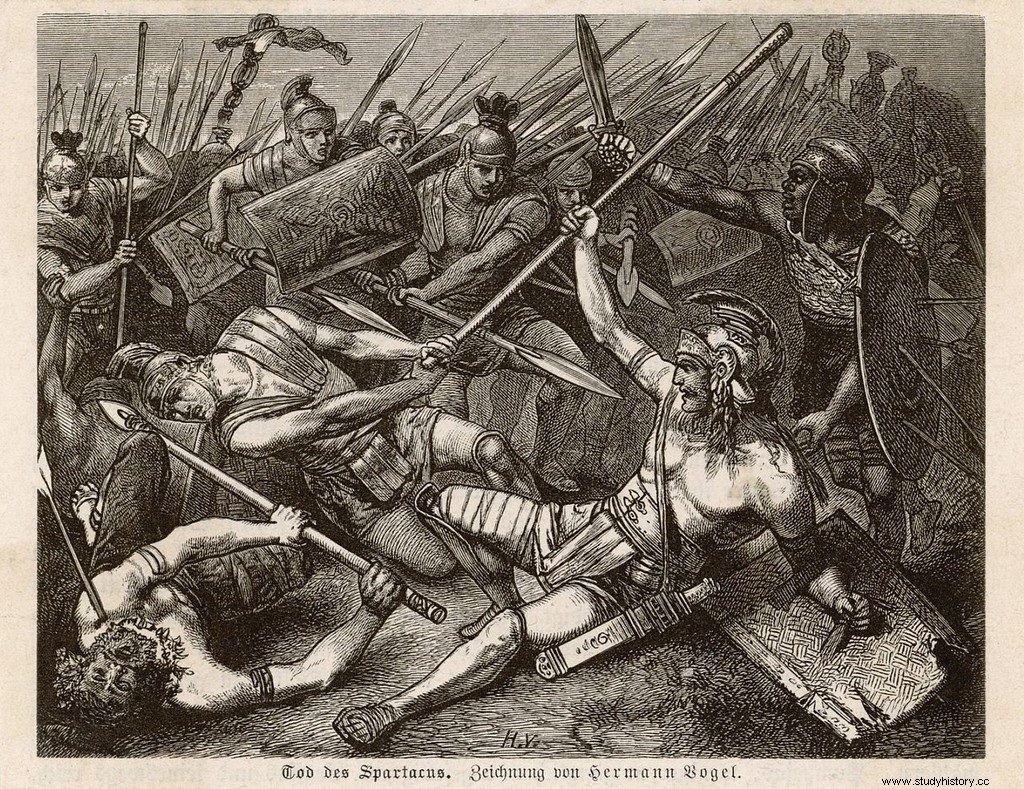
I think the most masterpiece of the movie set in ancient Rome is "Spartacus" directed by Stanley Kubrick and starring Kirk Douglas.
It is a masterpiece that is definitely in the top 100 in the history of world cinema even without the word "Rome", and of course there are famous actors such as Laurence Olivier and Tony Curtis, but the material of Spartacus I think the reason why Ran's dramaticness could be a masterpiece.
This time, I would like to see a person named Spartacus through such a turbulence of Spartacus.
I don't know much about being born except that I was born in Thrace
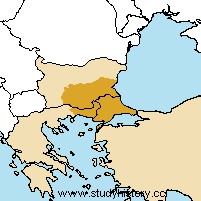
Little is known about Spartacus, except that it was born in Thrace.
Since he was a gladiator slave before the rebellion, it would be natural to see a person who was originally a Thracian soldier but was captured and sold as a slave.
Many gladiators wanted themselves because they gained fame and wealth, but there were many cases where those who lost the battle with Rome and became prisoners of war became gladiators, so from the standpoint of mercenaries. It is highly possible that he fought against Rome.
As for the origin, various scholars have developed various editorials since ancient times, and there is even an opinion that it may be the genealogy of the royal family, but it is not clear. However, it was not a general class because it has a fairly high command ability because it has defeated even the regular Roman soldiers trained as described later, and it does not seem to be just a mercenary or a graduate. I personally think.
Spartacus Rebellion
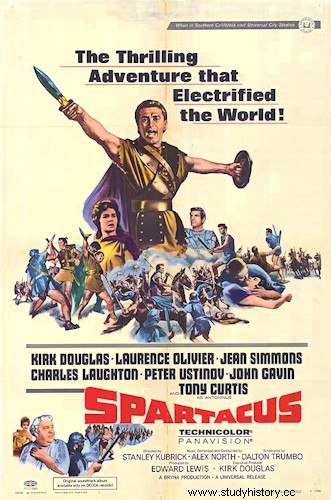
In 73 BC, dozens of gladiators fled the gladiator training center with Spartacus, robbed the arsenal and settled in Vesuvius volcano.
It seems that about 200 people were spending time in the Batiatus training center where Spartacus was, and the gladiators were spending time in a poor environment.
As soon as the incident became known to the neighborhood, slaves and fallen peasants in the neighborhood began to rush to Vesuvius volcano, and it was possible to organize an army.
The image of slaves is that they are shackled and whipped, but Rome is basically a slave society, and Roman citizens usually use a large number of slaves. If it is a slave who shave, it is a slave who cooks, and because he is educated with children, there are many who save money and become freed slaves.
Still, I think the majority were dissatisfied with the number of Spartacus rebellions.
In addition, after the Second Punic War, a large amount of cheap and high-quality wheat was imported from Sicily, small and medium-sized farmers began to fall, and the so-called proletariat class increased.
With such a background of the times, it can be said that the rebellion has become large-scale as many people rushed to Spartacus at Vesuvius volcano.
Spartacus is said to have put together such people well.
Most of the rebels of this type were looting, and they were usually chaotic and undisciplined, but Spartacus brought order to it and was well trained.
Of course, such a situation cannot be overlooked, and the Senate sent Praetor (legal officer class, the second class in Rome) gravel, but it was destroyed, and the next Valinius of the same class was dispatched. I couldn't get my hands or feet in front of Spartacus.
At that time, Rome was the strongest nation in the world, and although the commander was different, it had won the forces of Greece, Africa, Gallia, Spain, etc. in a nearly shutout manner. It can be said that the fact that it is defeated without sufficient armament indicates the high ability of Spartacus as a commander.
The Senate, who could not see it, sent two consuls (consuls), which is Rome the very best strategy, but succeeded in breaking the cooperation between the two armies and defeating each one. At this time, the Spartacus side lost Crixus, who could be called the co-commander of Spartacus, and it remains a famous anecdote that the Roman prisoners of war were made to play a gladiator match with the meaning of their condolences.
It may be the best example that what you do to a person will come back to you someday.
Three of them appeared in Crassus
The enemy of the movie Spartacus is, of course, Laurence Olivier, who plays Crassus, but the Senate takes military rights from two consuls and suppresses the rebellion of Crassus, who will later carry out three-headed politics with Caesar and Pompey. I sent it to.
Crassus had little military talent compared to Caesar and Pompey, but he still has something to do with history. He gradually hunts down the Spartacus corps, winning and losing repeatedly.
Many historians have different descriptions of the Spartacus Rebellion, and many do not even know exactly what the rebellion was for.
In particular, the Spartacus army's invasion route is irrational, heading south and north.
↓ Behavior from 73 BC to 72 BC
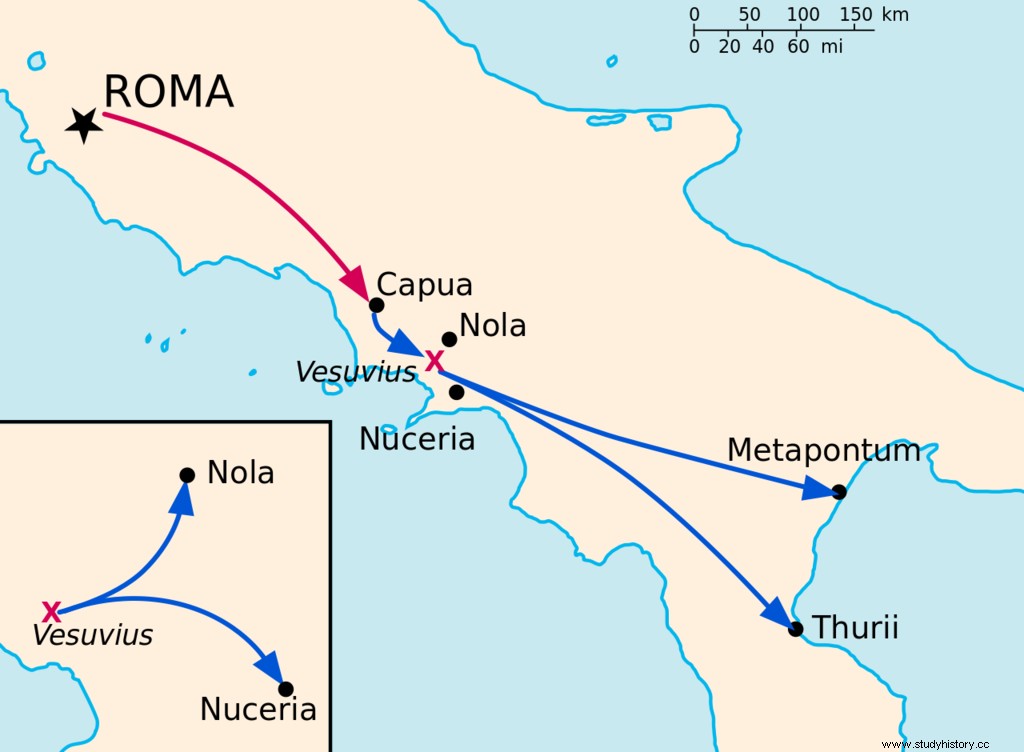
↓ The course of 72 BC.
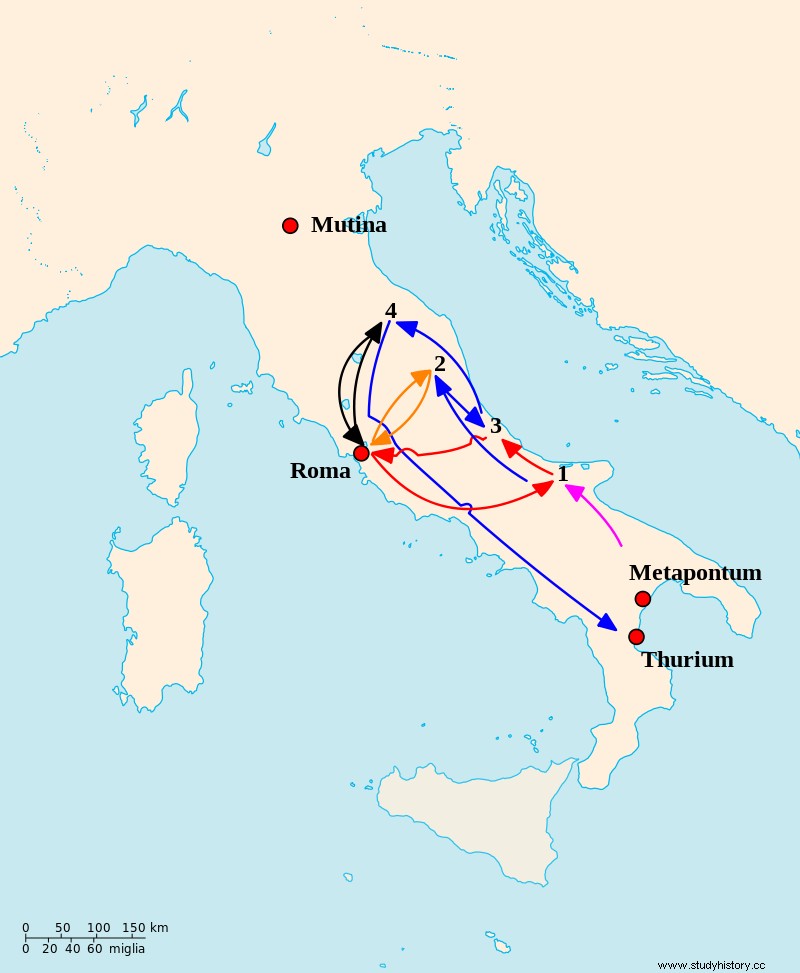
He takes the mysterious action of going north if he thinks he went south, and going south again if he heads for Rome.
One theory is that he has teamed up with King Pontus Mitridates, and that the fleet was not supposed to come to pick him up, and that he gave money to the pirates but the pirates broke his promise and headed north to cross the Alps. There are various theories such as theories from ancient times, but I'm still not sure about the march route.
In the battle with Crassus, there are both records that Crassus defeated alone and Pompey who returned from Spain subdued, and it is unknown which is true.
What we know is that Spartacus was defeated, and many were crucified and lined up along the Appian Way as a show.
Crassus made a name for himself in this matter and later dominated Roman politics, but that's another story.
The rebellion was subdued, but the body of Spartacus was not found until the end.
In Kubrick's Spartacus, there are scenes in which those who participated in the rebellion responded to the Roman soldier's question "Who is Spartacus?" It is a famous scene that made me cry.
Thinking about the Spartacus Rebellion
Rock and roll can be said to be rebellious music, but Spartacus is often used as a symbol of rebellion. Karl Marx, who published the Communist Manifesto, described Spartacus as "a true representative of ancient proletariat" and led to the formation of the Spartacus corps, a radical communist force in Germany.
In addition to Kubrick, there are also directors who have made movies, and they are also the subject of novels and movies.
It is probably because Spartacus did not allow any looting or robbery and fought with the weak. He was one of the few forces that defeated the legitimate Roman army known for his strength, and probably had top-notch abilities as a commander.
With the suppression of the Spartacus rebellion, large-scale slave rebellions no longer occur in Rome, and are now referred to as the Third Servile War as part of a series of slave rebellions that followed two slave rebellions in Sicily. Sometimes.
In Rome, it has long been feared alongside Hannibal as an object of fear, and when a child who does not stop crying says, "Spartacus will come," the child stopped crying.
If you win, the government army, if you lose, the thief army
As I see the Spartacus rebellion, I remember these words.
